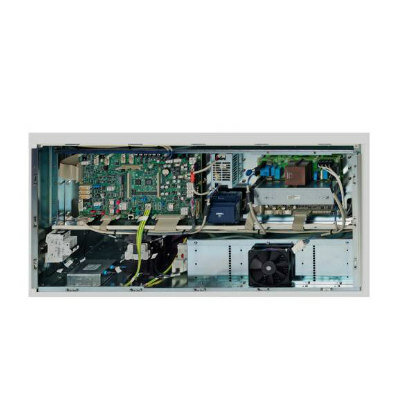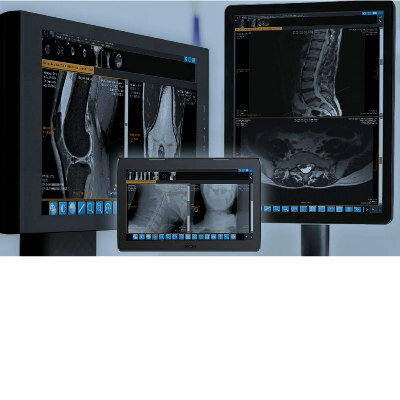New AI-Powered MRI System Speeds Technologist Workflow and Exam Times for Patients
|
By MedImaging International staff writers Posted on 25 Aug 2023 |

Magnetic resonance imaging (MRI) continues to remain a powerful diagnostic tool despite its extended acquisition times. Recent advancements in deep learning (DL) techniques have enabled rapid and high-quality image reconstructions from undersampled data, opening up new possibilities. A recent study showed that leveraging artificial intelligence (AI) for MRI image reconstruction can result in the delivery of scans four times faster compared to standard scans, potentially expanding MRI accessibility for a broader range of patients and minimizing appointment wait times.
FUJIFILM Healthcare Americas (Lexington, MA, USA) has unveiled its latest innovation, the ECHELON Synergy 1.5 Tesla MRI system. This system integrates Synergy DLR, FUJIFILM's proprietary Deep Learning Reconstruction (DLR) technology driven by AI. This technology enhances image sharpness and expedites scan acquisition times, resulting in improved throughput, image quality, and patient satisfaction. The ECHELON Synergy also introduces AutoExam One Touch operation, streamlining brain and knee exams through automated patient positioning and immediate scan initiation upon closing the scan room door.
The ECHELON Synergy boasts a generous 70 centimeter-wide bore and a 62 centimeter-wide table, capable of accommodating patients weighing up to 550 pounds. The incorporation of SoftSound gradient technology lowers acoustic noise, further improving the patient experience. To combat healthcare associated infections (HAIs), the ECHELON Synergy incorporates Fujifilm’s unique Hydro AG antibacterial coating onto its high-touch surfaces. This antibacterial coating offers an additional layer of defense against the growth of bacteria, microorganisms, and mold, showcasing an impressive efficacy of 99.99% against common bacteria. The ECHELON Synergy 1.5 Tesla MRI system has received FDA 510(k) clearance, marking a significant step forward in advancing patient care.
“Fujifilm is committed to delivering medical advancements focused on enhancing the patient’s experience while streamlining the workflow for today’s busy imaging providers,” said Shawn Etheridge, executive director, modality solutions, FUJIFILM Healthcare Americas Corporation. “ECHELON Synergy is designed to facilitate optimal comfort and help alleviate anxiety with its large bore and wide patient table. Alleviating any patient anxiety not only helps to enhance the patient experience, but could also improve a radiologist’s workflow, as the less nervous a patient, the more efficient and quickly the scan will get done.”
Related Links:
FUJIFILM Healthcare Americas
Latest MRI News
- PET/MRI Improves Diagnostic Accuracy for Prostate Cancer Patients
- Next Generation MR-Guided Focused Ultrasound Ushers In Future of Incisionless Neurosurgery
- Two-Part MRI Scan Detects Prostate Cancer More Quickly without Compromising Diagnostic Quality
- World’s Most Powerful MRI Machine Images Living Brain with Unrivaled Clarity
- New Whole-Body Imaging Technology Makes It Possible to View Inflammation on MRI Scan
- Combining Prostate MRI with Blood Test Can Avoid Unnecessary Prostate Biopsies
- New Treatment Combines MRI and Ultrasound to Control Prostate Cancer without Serious Side Effects
- MRI Improves Diagnosis and Treatment of Prostate Cancer
- Combined PET-MRI Scan Improves Treatment for Early Breast Cancer Patients
- 4D MRI Could Improve Clinical Assessment of Heart Blood Flow Abnormalities
- MRI-Guided Focused Ultrasound Therapy Shows Promise in Treating Prostate Cancer
- AI-Based MRI Tool Outperforms Current Brain Tumor Diagnosis Methods
- DW-MRI Lights up Small Ovarian Lesions like Light Bulbs
- Abbreviated Breast MRI Effective for High-Risk Screening without Compromising Diagnostic Accuracy
- New MRI Method Detects Alzheimer’s Earlier in People without Clinical Signs
- MRI Monitoring Reduces Mortality in Women at High Risk of BRCA1 Breast Cancer
Channels
Radiography
view channel
Novel Breast Imaging System Proves As Effective As Mammography
Breast cancer remains the most frequently diagnosed cancer among women. It is projected that one in eight women will be diagnosed with breast cancer during her lifetime, and one in 42 women who turn 50... Read more
AI Assistance Improves Breast-Cancer Screening by Reducing False Positives
Radiologists typically detect one case of cancer for every 200 mammograms reviewed. However, these evaluations often result in false positives, leading to unnecessary patient recalls for additional testing,... Read moreUltrasound
view channel
Deep Learning Advances Super-Resolution Ultrasound Imaging
Ultrasound localization microscopy (ULM) is an advanced imaging technique that offers high-resolution visualization of microvascular structures. It employs microbubbles, FDA-approved contrast agents, injected... Read more
Novel Ultrasound-Launched Targeted Nanoparticle Eliminates Biofilm and Bacterial Infection
Biofilms, formed by bacteria aggregating into dense communities for protection against harsh environmental conditions, are a significant contributor to various infectious diseases. Biofilms frequently... Read moreNuclear Medicine
view channel
New SPECT/CT Technique Could Change Imaging Practices and Increase Patient Access
The development of lead-212 (212Pb)-PSMA–based targeted alpha therapy (TAT) is garnering significant interest in treating patients with metastatic castration-resistant prostate cancer. The imaging of 212Pb,... Read moreNew Radiotheranostic System Detects and Treats Ovarian Cancer Noninvasively
Ovarian cancer is the most lethal gynecological cancer, with less than a 30% five-year survival rate for those diagnosed in late stages. Despite surgery and platinum-based chemotherapy being the standard... Read more
AI System Automatically and Reliably Detects Cardiac Amyloidosis Using Scintigraphy Imaging
Cardiac amyloidosis, a condition characterized by the buildup of abnormal protein deposits (amyloids) in the heart muscle, severely affects heart function and can lead to heart failure or death without... Read moreGeneral/Advanced Imaging
view channel
New AI Method Captures Uncertainty in Medical Images
In the field of biomedicine, segmentation is the process of annotating pixels from an important structure in medical images, such as organs or cells. Artificial Intelligence (AI) models are utilized to... Read more.jpg)
CT Coronary Angiography Reduces Need for Invasive Tests to Diagnose Coronary Artery Disease
Coronary artery disease (CAD), one of the leading causes of death worldwide, involves the narrowing of coronary arteries due to atherosclerosis, resulting in insufficient blood flow to the heart muscle.... Read more
Novel Blood Test Could Reduce Need for PET Imaging of Patients with Alzheimer’s
Alzheimer's disease (AD), a condition marked by cognitive decline and the presence of beta-amyloid (Aβ) plaques and neurofibrillary tangles in the brain, poses diagnostic challenges. Amyloid positron emission... Read more.jpg)
CT-Based Deep Learning Algorithm Accurately Differentiates Benign From Malignant Vertebral Fractures
The rise in the aging population is expected to result in a corresponding increase in the prevalence of vertebral fractures which can cause back pain or neurologic compromise, leading to impaired function... Read moreImaging IT
view channel
New Google Cloud Medical Imaging Suite Makes Imaging Healthcare Data More Accessible
Medical imaging is a critical tool used to diagnose patients, and there are billions of medical images scanned globally each year. Imaging data accounts for about 90% of all healthcare data1 and, until... Read more
Global AI in Medical Diagnostics Market to Be Driven by Demand for Image Recognition in Radiology
The global artificial intelligence (AI) in medical diagnostics market is expanding with early disease detection being one of its key applications and image recognition becoming a compelling consumer proposition... Read moreIndustry News
view channel
Bayer and Google Partner on New AI Product for Radiologists
Medical imaging data comprises around 90% of all healthcare data, and it is a highly complex and rich clinical data modality and serves as a vital tool for diagnosing patients. Each year, billions of medical... Read more




















